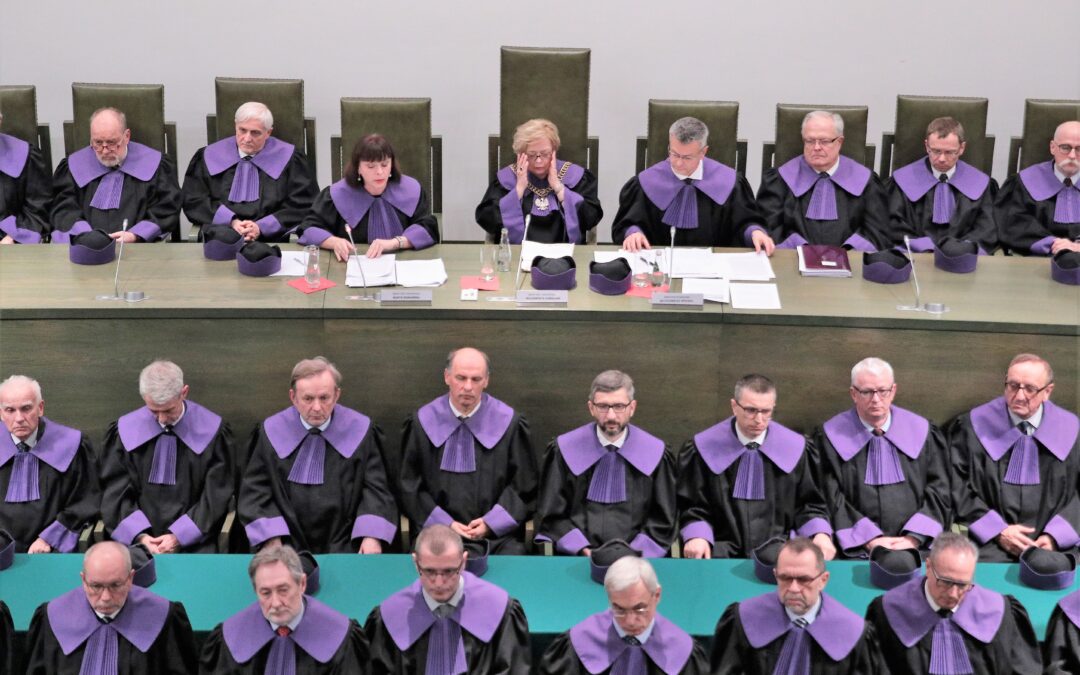Thirty judges on Poland’s Supreme Court – almost one third of those working at the institution – have declared that they will not adjudicate alongside colleagues who were appointed after the government overhauled the system for nominating judges.
They argue that, in accordance with a previous ruling of the Supreme Court itself, the government’s changes rendered subsequent judicial appointments invalid, and that therefore issuing rulings alongside newly appointed judges would be a violation of their oaths as jurists. The justice minister has, however, condemned the declaration.
At the heart of the dispute is the National Council of the Judiciary (KRS), the body constitutionally tasked with nominating judges to Poland’s courts.
In 2017-18, the KRS was reconstituted as part of the Law and Justice (PiS) government’s overhaul of the judiciary. Its members, previously chosen mainly by judges themselves, are now nominated mostly by politicians.
In December 2019, the Supreme Court found that, as a result, the “new” KRS “is not an impartial and independent body”. It then ruled the following month that judges nominated by the KRS since 2018 are illegitimate. This year, it further found that the KRS is no longer consistent with the constitution.
Meanwhile, the European Court of Human Rights (ECtHR) has also ruled that the KRS is “unduly influenced by legislative and executive powers” and is “defective”. Last year, Poland became the first country ever to be expelled from the European Network of Councils for the Judiciary.
However, despite such decisions, judges appointed by the “new” KRS have continued to adjudicate, including on the Supreme Court. One of them, Małgorzata Manowska, was appointed Supreme Court chief justice in 2020 and remains in the position.
The matter has now come to a head with the publication today of a letter to Manowska signed by 30 Supreme Court judges, all appointed by the “old”, pre-2018 KRS.
They inform her of “fundamental legal obstacles preventing our participation in examining cases involving persons appointed…in a defective procedure” by the “new” KRS.
The authors – who make up almost a third of the court’s 95 sitting judges – point to the Supreme Court’s own January 2020 ruling, which they note found that the involvement of such judges in cases is “improper” and “in contradiction with the provisions of the law”.
„Oświadczenie 30 sędziów SN to mocny głos skierowany do wszystkich sędziów w Polsce. Sędziowie SN pokazują, że należy wykonywać wyroki TSUE i ETPCz oraz historyczną uchwałę pełnego składu SN, w których podważono neo-KRS i nominowanych przez nią neo-sędziów”https://t.co/EKpWqJk0X4
— IUSTITIA Stowarzyszenie Sędziów Polskich (@JudgesSsp) October 17, 2022
“A judge may not participate in proceedings and issuing judgments if it is known in advance that this will be an absolute grounds for appeal or lead to the invalidity of the proceedings,” write the 30 “old” judges. They also note ECtHR rulings finding that proceedings involving “new” judges infringe the right to a fair trial.
As such, adjudicating alongside the “new” judges would violate the judicial oath to “serve the Republic of Poland faithfully” and “uphold the law and the rule of law”, write the “old” judges in their letter to Manowska, adding that they have now “exhausted [all other] measures to obtain the correct composition of the court”.
One of the authors, Michał Laskowski – who is chairman of the Supreme Court’s criminal chamber – told broadcaster TVN24 that their decision was a “last resort” at “the end of a long road” in which they have “repeatedly pointed out the irregularities in the state of the rule of law in Poland”.
Jakub Jaraczewski, a rule-of-law expert at Democracy Reporting International, describes the judges’ letter as “unprecedented” and an “earthquake”.
🇵🇱⚖️Monday afternoon Polish rule of law earthquake – 30 (thirty) "old" Supreme Court judges have issued a statement saying that they refuse to sit on court panels with "new" judges. 1/ https://t.co/YvKrHk6XgR
— Jakub Jaraczewski (@J_Jaraczewski) October 17, 2022
Justice minister Zbigniew Ziobro, however, criticised the judges’ actions. “If someone betrays their own calling, they should not be a judge, especially on the Supreme Court,” he said, quoted by news service Niezależna.
Ziobro noted that he has long sought to expel “judges who question the constitution” from the judiciary, but noted that in 2017 President Andrzej Duda had vetoed the most far-reaching legislation put forward by the government.
Today’s developments came just after the European Commission had confirmed that it is withholding further EU funds from Poland due to ongoing concerns over the rule of law. The Polish government insists that such concerns are unjustified and are in fact being used for political purposes.
The EU is withholding billions in Poland's cohesion funds – separate from the pandemic recovery funds that have also been frozen – due to concerns over the rule of law
"The commission cannot reimburse any expenditure submitted by Poland," says a spokesmanhttps://t.co/sCjz6u3mZt
— Notes from Poland 🇵🇱 (@notesfrompoland) October 17, 2022
Main image credit: Dawid Zuchowicz / Agencja Gazeta

Daniel Tilles is editor-in-chief of Notes from Poland. He has written on Polish affairs for a wide range of publications, including Foreign Policy, POLITICO Europe, EUobserver and Dziennik Gazeta Prawna.




















